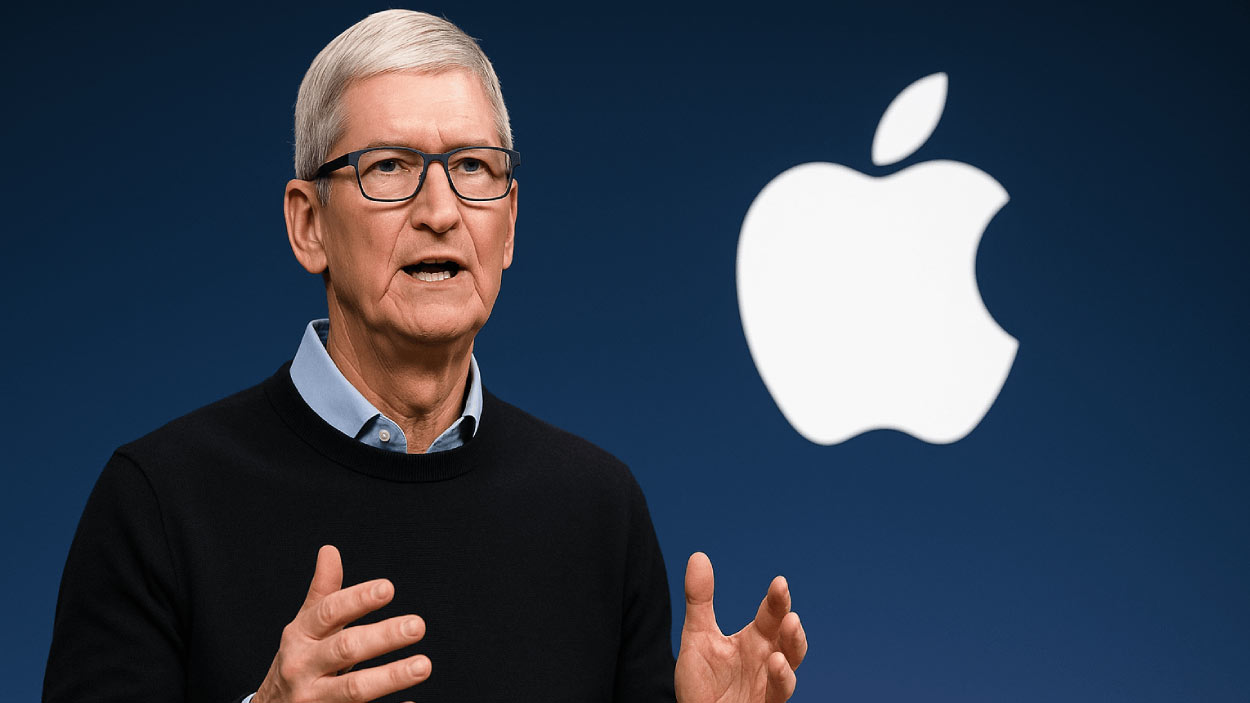Apple is stepping up its AI game, with CEO Tim Cook announcing major investments, workforce shifts, and upcoming feature launches across devices.
Quick Summary (TLDR):
- Tim Cook confirmed Apple is significantly increasing its investment in AI technologies
- Apple has already acquired seven companies in 2025 to boost its AI roadmap
- More than 20 AI features have launched, with personalized Siri updates due in 2026
- Apple dismisses rumors that AI glasses or new devices will replace the iPhone
What Happened
On its third-quarter 2025 earnings call, Apple CEO Tim Cook said the company is “significantly” growing its AI investments and reallocating staff to speed up development. This move aims to close the gap between Apple and its AI-driven competitors while preserving Apple’s strategy of delivering refined, user-friendly innovations.
Apple’s AI Ambitions Come Into Focus
Apple has often been seen as late to the AI race, but Cook made it clear the company is not sitting idle. He described AI as one of the most profound technologies of our time, and reiterated Apple’s mission to make such technologies accessible and easy to use.
- Over 20 Apple Intelligence features have already launched
- Upcoming tools include live translation and an AI-powered workout buddy
- A personalized Siri update is planned for 2026
- AI features will focus on being personal, private, and seamlessly integrated
Cook said Apple has reallocated a “fair number” of staff to focus on AI, underscoring the company’s intent to embed intelligence deeper into iOS and its product line.
M&A and Capital Spending on the Rise
To speed up its AI roadmap, Apple is also open to acquisitions. Cook confirmed that Apple has bought seven smaller companies this year, and reports suggest Apple may be eyeing Perplexity AI, an AI-powered search engine.
Apple’s capital expenditure is up this year, driven partly by AI development. Still, Cook noted that Apple continues to use a hybrid investment model involving third parties, which keeps the growth in CapEx moderate.
Cook also highlighted a broader commitment to U.S. investment, with $500 billion earmarked over four years. This includes expanding semiconductor manufacturing and launching a manufacturing academy in Detroit to train workers for the AI era.
Tariffs and Financial Performance
The AI push comes despite some economic headwinds. Apple warned of a $1.1 billion tariff hit in the fourth quarter, largely due to U.S. sanctions on imports from China. Cook said many iPhones sold in the U.S. are made in India, while Macs, iPads, and Apple Watches are mainly built in Vietnam.
Financially, Apple beat expectations:
- Q3 revenue rose 9.6% to $94 billion
- Net income hit $23.4 billion, or $1.57 per share
- iPhone revenue jumped 13% to $44.6 billion, setting a record
- Services revenue grew 13% to $27.4 billion, while iPad and wearables dipped
After-hours, Apple shares climbed 4% to $211.60 and were up further in premarket trading at $211.92 (+2.10%).
iPhone’s Future in an AI World
Addressing concerns that AI glasses or next-gen devices might replace smartphones, Cook pushed back on Meta CEO Mark Zuckerberg’s suggestion that AI wearables could make phones obsolete.
“It’s difficult to see a world where iPhone’s not living in it,” Cook said, emphasizing that AI devices will likely complement, not replace, the smartphone.
While rumours swirl about Apple entering the smart glasses race or building new AI hardware, Cook kept details close to the vest. However, he did confirm that Apple is preparing to ship Vision OS 26 for its AR headset.
SQ Magazine Takeaway
Apple may be fashionably late to the AI party, but it looks like it plans to show up in style. I like that they’re not rushing to throw half-baked products into the market. Instead, they’re channelling big money and top talent into building AI tools that actually work and fit smoothly into our lives. Whether it’s an AI-enhanced Siri or smart fitness features, Apple is playing the long game. And let’s be real, the iPhone isn’t going anywhere anytime soon.



































































